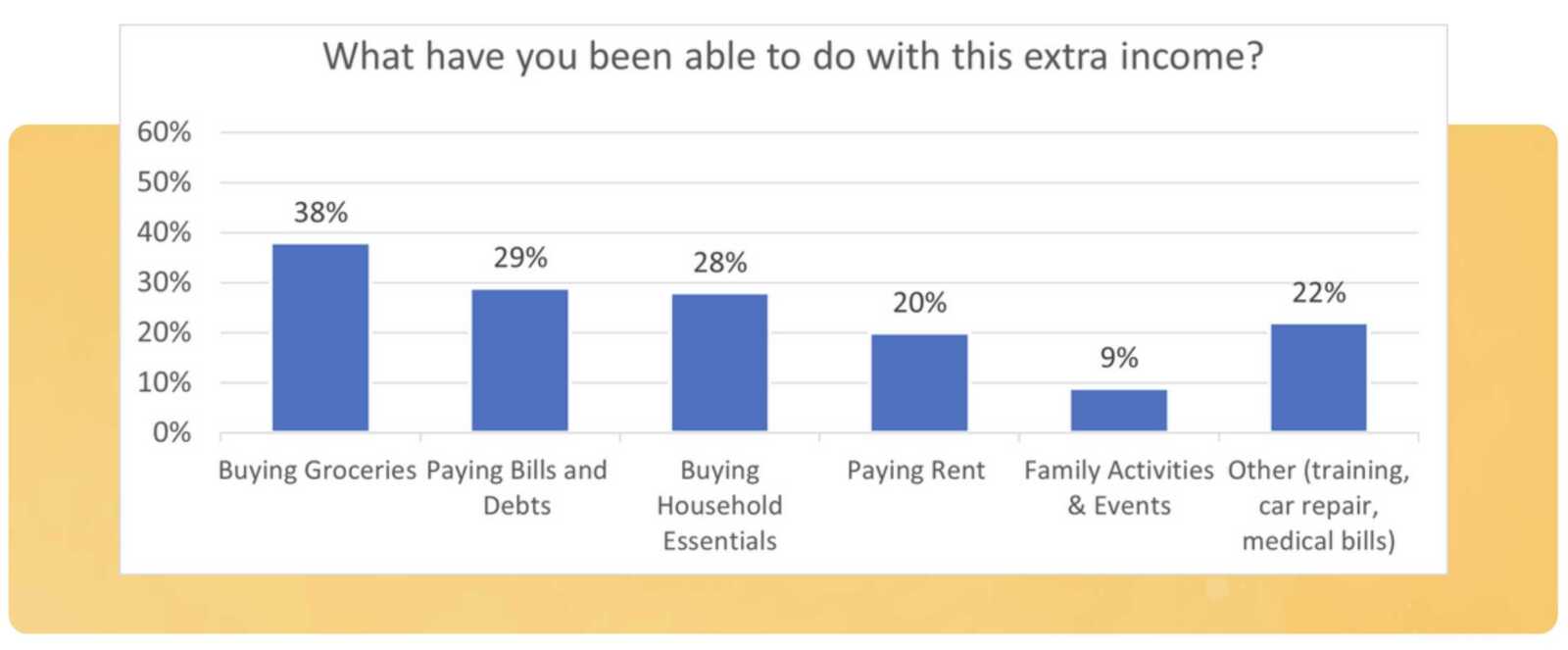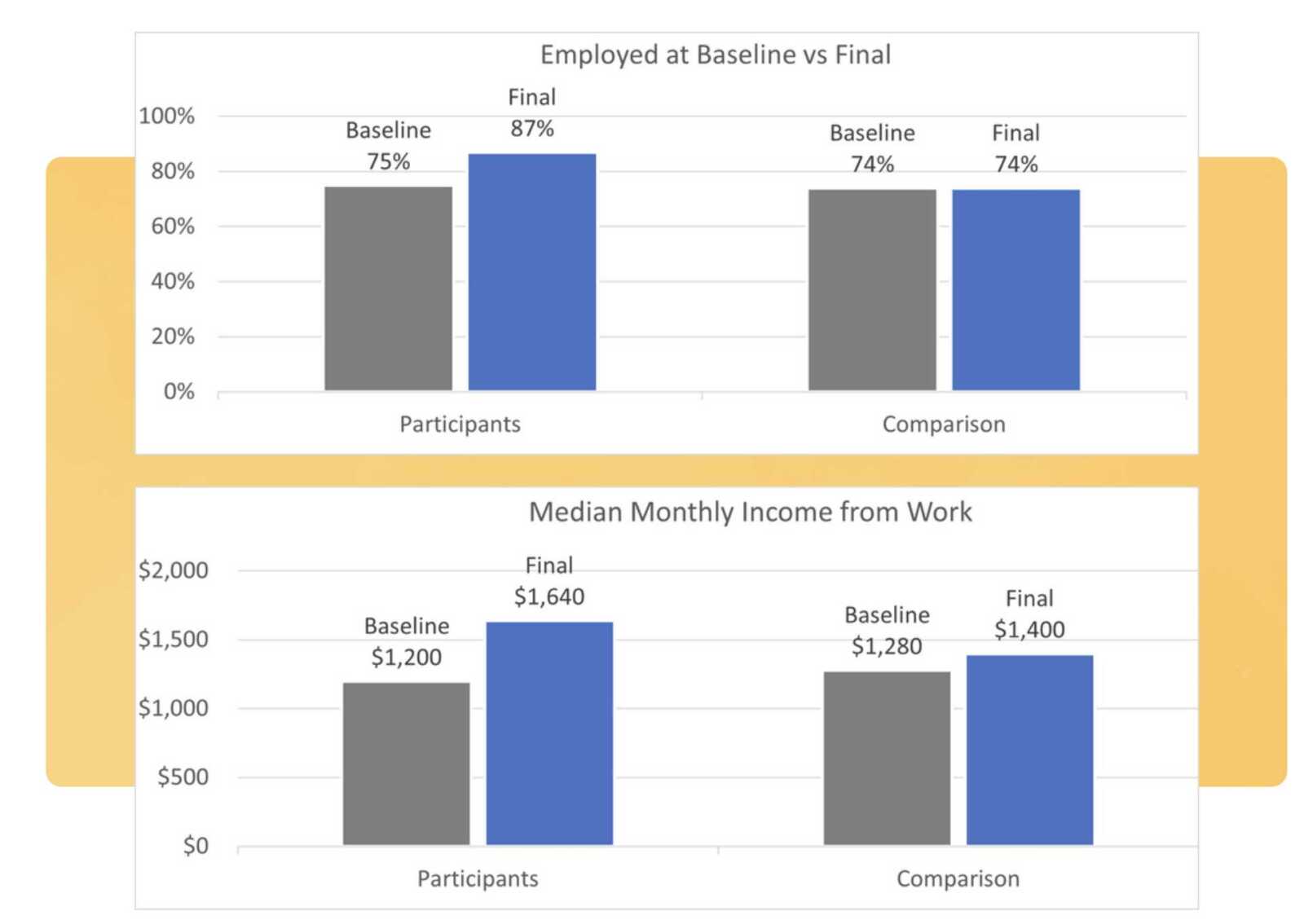By James Jarvis
See original post here.
Results from Arlington’s first guaranteed income pilot reveal that an additional $500 per month significantly enhanced the quality of life for impoverished families.
Parents with children under 18, earning less than $46,600 annually, reported that the additional $500 monthly helped them obtain better-paying jobs, address basic needs and improve their overall well-being, according to a new report by the Arlington Community Foundation (ACF), the local nonprofit that oversaw the pilot.
Moreover, the monthly payments enabled individuals to invest in certifications and educational advancement and tackle their medical bills, credit card debt and student loans.
Between September 2021 and last December, ACF provided the monthly stipend to families earning 30% of the area median income so they could continue living in Arlington, which is known for having some of the highest living costs in the nation.
The pilot sought to challenge the stigma associated with guaranteed income, which grants a minimum income to those who do not earn enough to support themselves. It drew inspiration from similar programs in Stockton, California, and Jackson, Mississippi.
In the long term, Arlington’s Guarantee is meant to persuade state and federal lawmakers to implement some form of guaranteed income. This is not to be confused with universal basic income, another touted policy reform that guarantees income to people regardless of their eligibility for government assistance or their ability to work.
Findings from the pilot come on the heels of a separate report, which found that more than half of families living in South Arlington cannot afford basic food, housing, medical and childcare expenses, compared to just 15% of families in North Arlington. ACF noted that most guaranteed income pilot participants reside in South Arlington.
While private donations and philanthropy fully funded the $2 million program, Arlington County’s Department of Human Services (DHS) helped select, track and evaluate participants.
DHS randomly chose 200 households to receive $500 a month and created a control group with similar demographics and income levels, which did not receive stipends, to compare the results. Most (53%) of participants identified as Black or African-American, followed by people who identify as white (23%). Thirty percent identified as Hispanic or Latino and 70% as non-Hispanic.
With the extra $500 a month, most participants reported putting the money toward groceries, paying bills, buying household essentials, rent and miscellaneous expenses including car repairs.


Individuals who received the stipend reported increasing their monthly income by 36%, from $1,200 to $1,640, compared to the control group, whose income only rose 9%. ACF says the extra cash gave participants breathing room to make investments that could improve their job prospects.
“Rather than working overtime or multiple jobs to meet basic needs, some participants reported using the time to pursue credentials… that could lead to a higher-paying job or starting their own business,” ACF said. “Other participants indicated that Arlington’s Guarantee helped them pursue better-paying jobs by allowing them to purchase interview clothes or cover the gap between their old and new jobs.”


By the end of the study, nearly three-quarters of participants who received a guaranteed income reported improved mental and physical well-being and an increased sense of control, compared to the control group.
“It’s a mental thing for me. Just the fact that I knew that I had an income coming, it helped me not have panic attacks,” said one participant. “I knew I could have food for the kids and pay the bills. It allowed me to use my time to be wise about money and not stressed about money.”
Still, most participants reported they still could not cover an unexpected $400 expense from their savings and said they would need to borrow money, get a loan or sell their belongings in case of an emergency. Income, food and housing insecurity were most acute among undocumented immigrants and those who were once incarcerated.
Arlington County is not the only locality in Northern Virginia experimenting with a guaranteed income program. Last year, Fairfax County also supported a guaranteed income pilot, offering a monthly stipend of $750 to 180 eligible families over 15 months.
Although the Arlington County Board signed a resolution imploring state and federal lawmakers to implement a guaranteed income program, neither it nor Fairfax County has indicated that a permanent version of these programs would be implemented locally.
Meanwhile, ACF said it has been engaging state lawmakers about the prospect of restoring the child tax credit, which expired in 2021, to help raise families out of poverty.
“This expanded federal CTC in 2021 was a game changer: it reduced child poverty by 46% by lifting 3.7 million children out of poverty before it was allowed to lapse in 2022,” the report said. “This was effectively a trial of guaranteed income policy by the federal government.”
The U.S. House of Representatives recently passed legislation to expand this credit, which has headed to the Senate for a vote. The tax credit offers a break of up to $2,000 per child, with potentially $1,600 of that being refundable. If signed into law, it would incrementally raise the tax credit amount of $100 annually through 2025.
Democrats in the Virginia General Assembly, meanwhile, have proposed establishing a child tax credit that would extend until 2029. A House of Delegates subcommittee voted yesterday to delay consideration of the bill until next year.





















